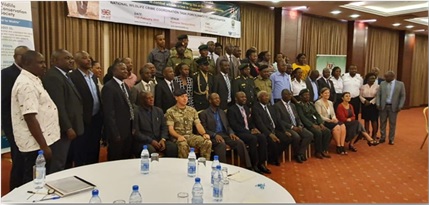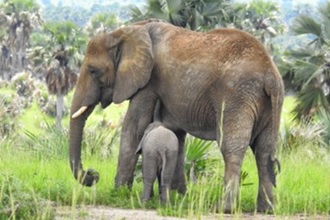A new taskforce dubbed “The National Wildlife Crime Coordination Task Force(NWCCTF)” has been inaugurated by the government of Uganda as part of efforts to combat wildlife crime of both a local and international nature.
The establishment of the task force, which comprises thirteen (13) law enforcement agencies, was facilitated by Wildlife Conservation Society, Uganda Program. The goal of the task force is to promote cooperation and coordination among the member institutions through information sharing, conducting join operations and expediting prosecutions aimed at combating wildlife crime in Uganda.
Despite various interventions
 by government institutions and private sector players, Uganda continued to register high poaching and illegal wildlife trade rates particularly in ivory, pangolins scales and hippo teeth owing to the demand for trophies, pets, and medicine in East Asia. This is attributed to the law enforcement agencies working in silos.[1]
by government institutions and private sector players, Uganda continued to register high poaching and illegal wildlife trade rates particularly in ivory, pangolins scales and hippo teeth owing to the demand for trophies, pets, and medicine in East Asia. This is attributed to the law enforcement agencies working in silos.[1]During the inauguration held at Kampala Serena Hotel in Uganda on 11th February 2020, Dr. Simon Nampindo, the Country Director of Wildlife Conservation Society in Uganda, explained that wildlife crime goes deeper than poaching because killing one elephant has devastating and long-lasting impacts that affect the reproductive cycle of succeeding sub adult females.
“When the matriarch is killed, sub-adult females are forced to inherit the responsibility of nurturing the young ones and genetically accumulate a lot of stress hormones that impedes reproduction,” Nampindo expounded.
On his part, General Elly Tumwine, the Minister for Security argued that government institutions can no longer continue to work in silos, particularly when tackling a threat of a multidimensional nature.“Wildlife crime threatens national security because it is associated with drugs and narcotics, arms smuggling and major international syndicates that use their financial muscle to destabilize developing countries by financing insurgency,” General Tumwine clarified.
major international syndicates that use their financial muscle to destabilize developing countries by financing insurgency,” General Tumwine clarified.
The Minister for Tourism, Wildlife and Antiquities(MTWA), Colonel (retired) Tom Butime said, “Illegal wildlife trade today is a complex and lucrative business managed by global cartels; the task force has to use futuristic strategies if they are to beat them at their own game.”
Cartels are increasingly becoming sophisticated especially now that people have free and easy access to the internet. Ordinary law enforcement can no longer suffice thus the need for continuous innovative strategies.[2]
Commenting on the role of the communities, the Minister of State for Tourism, Godfrey Kiwanda said that the government has embarked on sensitizing the general public; more so, the communities neighbouring protected areas to create awareness about the new Wildlife Act 2019. [3]
“Communities have to take the initiative to protect wildlife. When poaching thrives, the tourist numbers to Uganda and monies earned from them also reduces. This negatively impacts their livelihood and the shared revenue,” he expounded.
Each institution in the task force brings to the table different technical and technological expertise and networks and by jointly working together, members will be able to efficiently and expeditiously leverage their respective capacities to tackle wildlife crime as a whole in Uganda.
 The task force will serve as the umbrella body with the overall command and with specialized subsections in the areas where there are gaps such as prosecution.
The task force will serve as the umbrella body with the overall command and with specialized subsections in the areas where there are gaps such as prosecution.
Over the last two years, the task force has developed standard operating procedures and contributed towards the development of the National Strategy for combating Poaching, Illegal Trade and Trafficking of Wildlife and Wildlife Products that still await ministerial approval.
Soon after the launch, the NWCCTF focal persons proceeded for a three-day training session intended to instruct the taskforce in intelligence-led operations and to assess their individual institutional capacity needs.
The meeting was organized by the MTWA in partnership with UWA and WCS and with funding from The Illegal Wildlife Trade Challenge Fund of the UK government.
This comes at a time when the standing committee of the Convention On International Trade in Endangered Species of Wild Fauna and Flora(CITES) is still scrutinizing Uganda following its removal from the ‘gang of eight’, countries known for doing little or nothing to curb illegal trade.
Illegal wildlife trade is a multi-billion-dollar criminal industry whose annual proceeds to date are estimated at 36 trillion Uganda shilling, is the biggest poaching driver among other factors.[4]
Founded in May 2018, the NWCCTF comprises: Uganda Wildlife Authority, Uganda People’s Defense Force, Uganda Police Force (CID and INTERPOL), Financial Intelligence Authority, Uganda Revenue Authority (Customs Department), Internal Security Organization, External Security Organization, National Forestry Authority, National Environment Management Authority (Environmental Police), Civil Aviation Authority, Office of the Director of Public Prosecutions and Directorate of Citizenship and immigration control.
[1] Uganda Wildlife Trafficking Assessment, a Traffic Report by Alessandra Rossi
[2] Wildlife Crime and Security by Daan P. van Uhm
[3] The Uganda Wildlife Act, 2019
[4] Criminal networks and illicit wildlife trade William Robert Avis